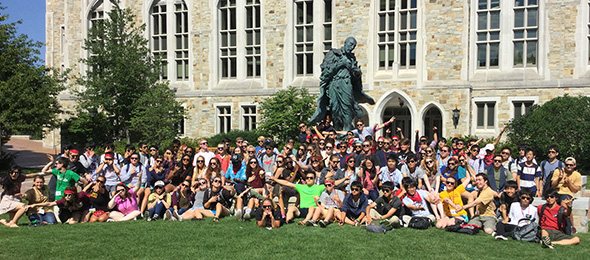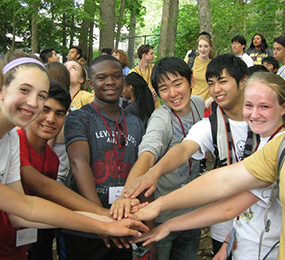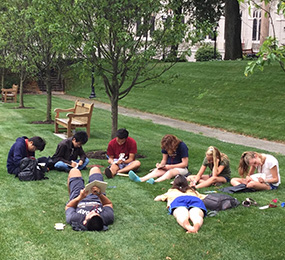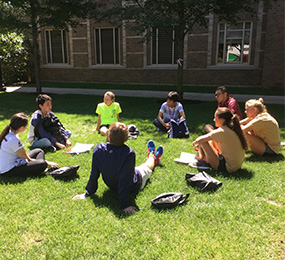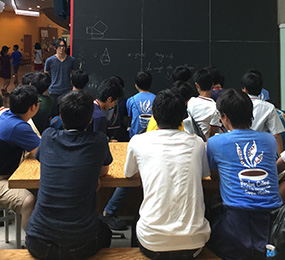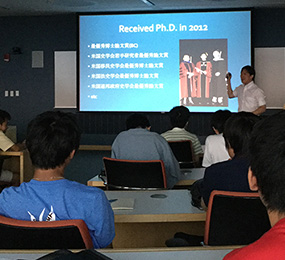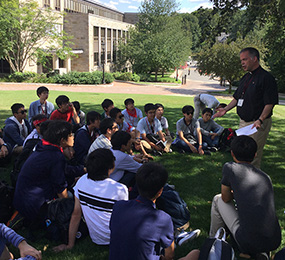International Education
All Jesuit institutions worldwide seek through their educational activities to cultivate men of a certain profile. That profile consists of “men for others, with others”: men who live to benefit others as they live in their midst.
Since its opening in 1947, it has been the mission of Eiko Gakuen to develop leaders. By “leader” we do not mean those who compel others to do their bidding by force of authority, but men who lead by serving and contributing to the happiness of others.
The global society of the future will see rapid movement worldwide of people, goods and information. In such a world, what qualities will be required of the leaders produced by Eiko Gakuen?
Of course, some of these leaders will be active across borders, in a wide range of scenes internationally. Yet even those whose geographical scope is confined to a single region must be able to think and act from a global perspective based on Christian humanism. People who possess such qualities are called upon not to build walls to shut out the socially disadvantaged or to protect their own countries but to build bridges among the nations and peoples of the world and contribute to their happiness. As a Jesuit school, Eiko Gakuen strives to send out into the world people who can play active roles as true global leaders of this type.
A more detailed look at the profile of such leaders is provided below.
- 1. A man invested with wisdom rooted in Christian humanism, who seeks solutions to the problems confronting international society and doggedly pursues them until he has arrived at a solution
(Empathizes with the poor and disadvantaged, concerns himself with and understands social problems, pursues his goals tenaciously) - 2. A man who has a will to build communications with people of different national and cultural backgrounds and can make every effort to learn about those differences and overcome antagonism and schism
(Communication skills, language skills, acceptance of other cultures) - 3. A man with a global perspective who can find a road that people of the world can travel together, never sacrificing the needs of other countries to put his own country's interests first, but working in a mutually beneficial manner with others to build a new society
(Logical faculty, social imagination, interest in problems on a global scale)
Those who never have the opportunity to venture outside their sphere of daily existence have few chances to learn how their country is positioned with respect to those around it or what sorts of things are expected of it. As a result they are unable to regard themselves objectively as humans living in the world. Students in this circumstance become myopic, setting only the objectives in front of their noses as their life goals.
The aim of Eiko Gakuen’s International Exchange Program is to cultivate the global leaders the world of the future will need: inter alia, the global leaders that a Jesuit education strives to produce. A unique characteristic of the International Exchange Program is that it marshals the global network of Jesuit educational institutions to achieve its aims.
However much the social, economic and cultural issues and conditions that educational institutions face may differ according to their countries or regions, the goals of a Jesuit education are the same. Through this understanding, Eiko Gakuen’s International Exchange Program aims to send into the world people who achieve the ideal profile of a graduate of a Jesuit school.
Short-term Exchange Study with Eiko Gakuen's Sister School in Cebu
The central focus of Eiko Gakuen’s international-exchange activities is Sacred Heart School-Ateneo de Cebu (SHS-AdC) in the Republic of the Philippines. This school is located in Mandaue City, next to Cebu City on the island of Cebu. The aim of this program is “to give students experiences of other cultures that they everyday school life cannot offer, thereby fostering an international perspective through mutual enlightenment.” With the understanding and cooperation of the families of students at SHS-AdC and Eiko Gakuen, the School accepts exchange students from SHS-AdC in May and sends students to SHS-AdC in August.
Why the Philippines?
The population of the Philippines is overwhelmingly Catholic (85%). As a nearby Asian developing country, the Philippines offers an ideal setting for experiencing a different culture. Another advantage is that English is one of the official languages of the Philippines. Students can use the English they are learning at Eiko Gakuen as a means of communication during their stay.
Why SHS-AdC?
SHS-AdC is enthusiastically engaged in exchange with schools in Japan. Like Eiko Gakuen, SHS-AdC is a Jesuit senior high school. Both schools are keenly interested in both sending and accepting exchange students. For both SHS-AdC and Eiko Gakuen, exchange-study activity is founded on three pillars: (1) Homestay, (2) school stay (attending regular classes along with local students) and (3) exposure (learning through experience).
Introduction to the Program
| Hosting | Around May, 10 students from SHS-AdC enjoy homestays with families of Eiko Gakuen students and attend school with them, for about two weeks. During the Eiko Festival, SHS-AdC students and Eiko Gakuen students display exhibits about the Philippines. |
|---|---|
| Sending | Around August, 10 students from Eiko Gakuen (S1 & S2) enjoy homestays with families of SHS-AdC students and attend school with them, for about two weeks. During classes, Eiko Gakuen students offer presentations about Japan. To provide opportunities to observe the Philippine social milieu, students also enjoy a stay in an ordinary Filipino community other than that of the homestay. |
History of International Exchange Activities at Eiko Gakuen
| 1992 | Launch of the International Exchange Committee In the fall, the School welcomed seven students from Aquinas High School in Australia for a two-week visit. |
|---|---|
| 1994 | Eiko Gakuen prepared for exchange with high schools in the Philippines (Eiko Gakuen teachers traveled to Manila and Cebu City to observe Jesuit high schools there). |
| 1995 | Eiko Gakuen prepared for exchange with Sacred Heart School for Boys (SHS-B). Eiko Gakuen and SHS-B teachers observed each other's schools. |
| 1996 to 1999 | The first to fourth exchange sessions were conducted. Eiko Gakuen welcomed students from SHS-B and sent Eiko Gakuen students to SHS-B. |
| 2000 | The fifth exchange session was conducted. Eiko Gakuen welcomed students from SHS-J and dispatched Eiko Gakuen students to SHS-J (the name of the latter school had been changed to Sacred Heart School-Jesuit (SHS-J)). |
| 2001 to 2008 | The sixth to 13th exchange sessions were conducted. Eiko Gakuen welcomed students from SHS-B and sent Eiko Gakuen students to SHS-B. |
| 2009 | NO students were sent to Cebu due to the proliferation of a new strain of influenza.They were sent the following year. Also this year, SHS-J changed its name to Sacred Heart School-Ateneo de Cebu (SHS-AdC). |
| 2017 | The 22nd exchange session was conducted. The program is expected to continue on a yearly basis indefinitely. |
Summer Study at Boston College
Every year 30 students from Eiko Gakuen take part in the Ever to Excel program (https://www.bc.edu/centers/iajs/Programs/Ever-To-Excel.html) offered by the Institute for Advanced Jesuit Studies at Boston College, in the US state of Massachusetts. On a university campus redolent with the Jesuit spirit, Eiko Gakuen students join high-school students from every part of the United States for an in-depth experience of Jesuit spirituality, leadership, ministry and education. Through this program, participants recognize the talents granted by God to each one and consider how best to use them now and in the future. In fellowship with other participants, mentors (leaders) and instructors, Eiko Gakuen students spend an extraordinary week thinking deeply about life.
Program Content
A different theme is set for each day of the Ever to Excel program. Each day participants think and reflect deeply about the day's theme.
| 1st day Foundation / Identity |
What does it mean to experience selfless love? How are we to govern ourselves? |
|---|---|
| 2nd day Formation / Voice |
How have your mentors and friends influenced your growth as a person? |
| 3rd day Discernment / Pilgrimage |
How have you made the decisions you have faced on life's journey? What impact have those decisions had? |
| 4th day Mission / Service |
What does it mean to minister for others with a generous spirit? What do you hope for in this regard? |
| 5th day Magis / Ever to Excel |
How can we pursue excellence throughout our lives (discovering God in everything) and continue? |
On each of the themes listed above, participants listen to lectures and panel discussions, then take part in group discussions afterward. The experience is challenging for Eiko Gakuen students, as they are mixed in with American students and must converse in English. Fortunately, the mentors are there to help, and the Japanese students soon find themselves getting into the swing of things. Afternoons are spent hiking, sightseeing around the city and attending social events such as ice cream parties, so participants enjoy extensive interaction and exchange with each other.
Separately from Ever to Excel, participants visit universities other than Boston College during their visit to Boston. Tours of the Harvard and MIT campuses are conducted, and participants chat with Eiko Gakuen alumni who are currently enrolled at or are graduates of one of these three universities.
